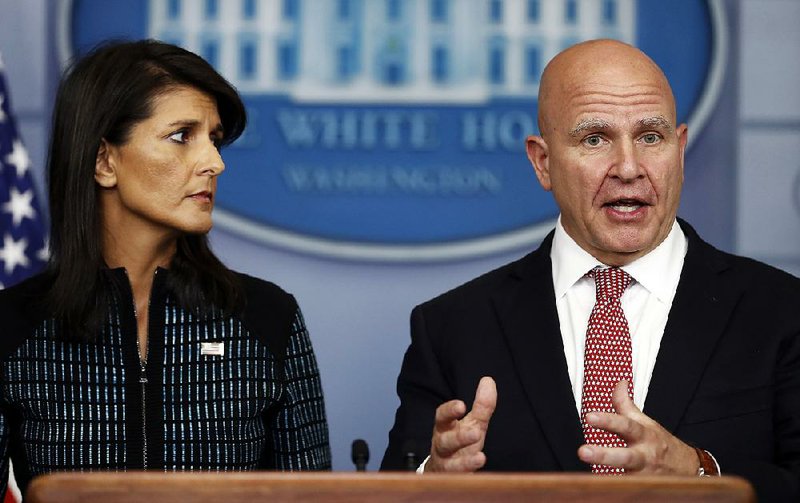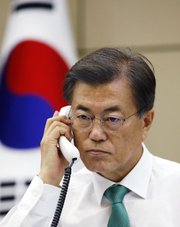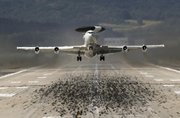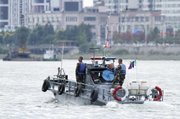UNITED NATIONS -- The U.N. Security Council on Friday condemned North Korea's "highly provocative" ballistic missile test and demanded that the nation immediately halt its "outrageous actions" and demonstrate its commitment to denuclearizing the Korean Peninsula.
The U.N.'s most powerful body accused North Korea of undermining regional peace and security by launching its latest missile over Japan and said the nuclear and missile tests "have caused grave security concerns around the world" and threaten all 193 U.N. member states.
North Korea's longest-ever test flight of a ballistic missile early Friday from Sunan, the location of Pyongyang's international airport, signaled North Korea's defiance and technological advances. After soaring over Japan, the missile landed in the northern Pacific Ocean.
Since U.S. President Donald Trump threatened North Korea with "fire and fury" in August, the North has conducted its most powerful nuclear test, threatened to send missiles into the waters around the U.S. Pacific island territory of Guam and launched two missiles of increasing range over Japan. July saw the country's first tests of intercontinental ballistic missiles that could strike deep into the U.S. mainland.
Friday's intermediate-range missile test came four days after the Security Council imposed tough new sanctions on the North for its Sept. 3 missile test. Sanctions included a ban on textile exports, and caps on its import of oil and petroleum products. The U.S. said the latest sanctions, combined with previous measures, would stop more than 90 percent of North Korea's exports as reported in 2016. Those exports are the main source of hard currency it uses to finance its nuclear and missile programs.
North Korea's Foreign Ministry denounced the sanctions and said the North would "redouble its efforts to increase its strength to safeguard the country's sovereignty and right to existence."
The Security Council stressed in Friday's news statement after a private emergency meeting that all countries must "fully, comprehensively and immediately" implement all U.N. sanctions.
Japan's U.N. Ambassador Koro Bessho called the missile launch an "outrageous act" that is "not only a threat to Japan's security but a threat to the world as a whole."
Bessho and the British, French and Swedish ambassadors demanded that all sanctions be implemented.
Calling the latest launch a "terrible, egregious, illegal, provocative, reckless act," Britain's U.N. Ambassador Matthew Rycroft said North Korea's largest trading partners and closest links -- a clear reference to China -- must "demonstrate that they are doing everything in their power to implement the sanctions of the Security Council and to encourage the North Korean regime to change course."
France's Foreign Ministry said in a statement that his country is ready to work on tougher U.N. and European Union measures to convince Pyongyang that there is no interest in an escalation and to get North Koreans to the negotiating table. It said North Korea will also be discussed during next week's annual gathering of world leaders at the General Assembly.
The Security Council also emphasized the importance of North Korea working to reduce tension in the Korean Peninsula, and it reiterated the importance of maintaining peace and stability on the territory divided between authoritarian North Korea and democratic South Korea.
The council welcomed efforts by its members and other countries "to facilitate a peaceful and comprehensive solution" to the North Korean nuclear issue through dialogue.
The U.S. still views China and Russia as key to the diplomatic and economic effort to move North Korea toward compliance with international demands to halt missile and bomb development. The U.S. keeps urging China to use its oil deliveries to North Korea as leverage to change the behavior of Kim's regime, but the Chinese remain reluctant.
U.S. Secretary of State Rex Tillerson reiterated a call for China and Russia to act against the rogue state, saying in a statement: "China supplies North Korea with most of its oil. Russia is the largest employer of North Korean forced labor."
And Nikki Haley, the United States ambassador to the U.N., said the absence at the U.N. meeting of Russian President Vladimir Putin and Chinese President Xi Jinping won't prevent the U.S. from making progress.
Russia's U.N. Ambassador Vassily Nebenzia strongly backed the need for dialogue saying the United States needs to start talks with North Korea, which the Trump administration has ruled out.
Nebenzia told reporters after the meeting that Russia called on the U.S. and others to implement the "political and diplomatic solutions" called for in the latest sanctions resolution.
"Without implementing this, we also will consider it as a noncompliance with the resolution," Nebenzia said, adding that it also may be time for the council to "think out of the box" on how to deal with North Korea.
The U.S. won't push for more United Nations sanctions against North Korea when the General Assembly opens next week in New York, but Trump plans to urge individual world leaders to keep ratcheting up pressure on Kim Jong Un's regime, Trump administration officials said.
Trump will meet with numerous other heads of state and government officials during his trip to New York, including leaders of Israel, Turkey, South Korea, Japan and Qatar. North Korea will be a major focus for the president, along with Iran's actions in the Middle East, they said.
The growing frequency, power and confidence displayed by Pyongyang's nuclear and missile tests seem to confirm what governments and outside experts have long feared: North Korea is closer than ever to its goal of building a military arsenal that can viably target U.S. troops in Asia and in the U.S. homeland.
This, in turn, is intended to allow North Korea greater military freedom in the region by raising doubts in Seoul and Tokyo that Washington would risk the annihilation of a U.S. city to protect its Asian allies.
South Korea's joint chiefs of staff said the latest missile traveled about 2,300 miles and reached a maximum height of 478 miles. Guam, which is the home of important U.S. military assets, is 2,112 miles from North Korea.
Despite its range, the missile probably still is not accurate enough to destroy Guam's Andersen Air Force Base, said David Wright, a U.S. missile expert with the Union of Concerned Scientists.
South Korean President Moon Jae-in, a liberal who initially pushed for talks with North Korea, said its tests currently make dialogue "impossible."
"If North Korea provokes us or our allies, we have the strength to smash the attempt at an early stage and inflict a level of damage it would be impossible to recover from," he said.
H.R. McMaster, Trump's national security adviser, said the U.S. has a military option for North Korea, but that is not its preferred route.
McMaster called on all nations to enforce the sanctions and do everything they can to address the threat and prevent war.
North Korea has repeatedly vowed to continue its weapons tests amid what it calls U.S. hostility -- by which it means the presence of nearly 80,000 U.S. troops stationed in Japan and South Korea.
Robust international diplomacy on the issue has been stalled for years, and there's so far little sign that senior officials from North Korea and the U.S. might sit down to discuss ways to slow the North's determined march toward inclusion among the world's nuclear weapons powers.
South Korea detected North Korean launch preparations Thursday, and President Moon Jae-in ordered a live-fire ballistic missile drill if the launch happened. This allowed Seoul to fire missiles only 6 minutes after the North's launch Friday.
One of the two missiles hit a sea target about 155 miles away, which was approximately the distance to Pyongyang's Sunan, but the other failed in flight shortly after launch.
South Korea and Japan differed Friday on providing humanitarian aid to North Korea's malnourished children and pregnant women.
Moon and Japanese Prime Minister Shinzo Abe talked on the phone Friday, sharing their condemnation of North Korea's latest missile test and vowing to work together to bring about more sanctions against the country, Moon's office said.
But Abe took issue with South Korea's plan to donate $8 million to two United Nations humanitarian programs in North Korea. He asked Moon to reconsider the timing of the aid, Moon's office said.
On Thursday, South Korea announced plans to donate $4.5 million to help the World Food Program provide nutrition-rich supplies to North Korean hospitals and day care centers. It also plans to donate $3.5 million to U.N. Children's Fund projects that supply vaccines, medicine and malnutrition treatment to children and pregnant women.
Yoshihide Suga, Japan's chief Cabinet secretary, said Thursday that providing aid for North Korea could undermine international efforts to pressure Pyongyang. But hours after the North's missile launch Friday, South Korea reconfirmed its humanitarian aid plans.
The latest sanctions would further isolate North Korea's economy, making more vulnerable its malnourished classes, including children, nursing mothers and older people, said Lee Eugene, a spokesman for South Korea's Ministry of Unification. South Korea plans to complete the timing and details of its humanitarian aid package next week.
"They are for providing cereals and vaccines for these vulnerable classes," Lee said, referring to the U.N. aid programs. "I don't think this violates the spirit of the United Nations."
Information for this article was contributed by Edith M. Lederer, Kim Tong-Hyung, Foster Klug, Mari Yamaguchi, Deb Riechmann, Darlene Superville, Laurie Kellman and Ken Thomas of The Associated Press; by Choe Sang-Hun of The New York Times; and by Margaret Talev, Nick Wadhams, Toluse Olorunnipa, Isabel Reynolds, Shoko Oda, Lily Nonomiya, Kiyotaka Matsuda, John McCluskey, Sam Kim, Chelsea Mes, Justin Sink, Heejin Kim, Seyoon Kim, Jonathan Annells, Min Jeong Lee, Shin Shoji, Emi Nobuhiro, Maiko Takahashi, Peter Martin, Kanga Kong and David Tweed of Bloomberg News.
A Section on 09/16/2017





